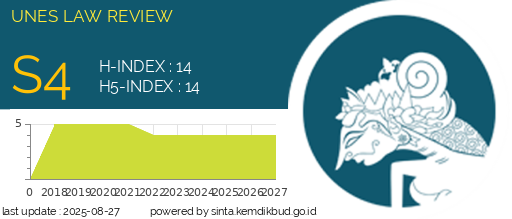Tindak Pidana Kesusilaan Ditinjau dalam Undang-Undang Darurat Nomor 1 Tahun 1951, KUHP dan KUHP 2023
DOI:
https://doi.org/10.31933/unesrev.v6i1.647Keywords:
Construction Implementation, Perverted sexual, Prisoner, Legal CertaintyAbstract
This article will examine the Criminal Law loophole which can still be found in the qualification of the crime of, “having intercourse with a woman out of wedlock”. In Verdict Number 30/Pid.B/2017/PN.bdw the perpetrator of crime and the victim who are both adults and without marital ties have intercourse without coercion, threats of violence and/or violence in different private areas. The Bondowoso District Court judge sentenced the perpetrator to three years in prison with a subsidiary indictment of the Public Prosecutor, namely Article 5 paragraph (3) letter b of the Emergency Law Number 1 of 1951 jo. Article 289 of the Criminal Code in Verdict Number 30/Pid.B/2017/PN.Bdw. This article will examine the accuracy of Article in Verdict Number 30/Pid.B/2017/PN.Bdw which uses Article 5 paragraph (3) letter b of the Emergency Law Number 1 of 1951 jo. Article 289 of the Criminal Code regarding the criminal act of obscenity and to examine the application of Article 412 in the new Criminal Code no. 1 of 2023 for perpetrators of criminal acts in Verdict Number 30/Pid.B/PN.Bdw.The research uses normative juridical research with statute approach and a conceptual approach.The temporary conclusion of this article is that the act of two single adults who have intercourse with the promise of marriage is still not punishable by crime. Indonesia's positive law and criminal law reforms still have legal loopholes, so they require government regulations to regulate actions that are considered morally bad. Law enforces need to take a legal sources outside of the appropriate law to convict perpetrator of criminal acts are that unequaled in the Criminal Code to fill the legal vacuum so that it does not become arbitrary space for law enforcers.
Downloads
References
Soepomo, Kedudukan Hukum Adat di Kemudian Hari. Djakarta: Pustaka Rakjat, 1951
Soesilo, R. Kitab Undang-Undang Hukum Pidana serta Komentar-komentarnya Lengkap Pasal demi Pasal. Bogor: Politeia, 1991
Sudiyat. Hukum Adat Sketsa Asas, Yogyakarta: Liberty Yogyakarta, 2000
Marzuki, Peter Mahmud. Penelitian Hukum. Jakarta: Prenada Media, 2005
Chazawi, Adami. Pelajaran Hukum Pidana (Bagian I). Jakarta: Rajawali Pers, 2012
Hamzah, Andi. Surat Dakwaan dalam Hukum Acara Pidana Indonesia. Bandung: PT Alumni, 2016
Undang-Undang Nomor 1 Tahun 1946 Tentang Hukum Pidana
Undang-Undang Nomor 23 Tahun 1947 Tentang Penghapusan Pengadilan Raja di Jawa dan Sumatera
Undang-Undang Nomor 7 Tahun 1950 tentang Perubahan Konstitusi Sementara Republik Indonesia Serikat Menjadi Undang-Undang Dasar Sementara Republik Indonesia
Undang-Undang Darurat Nomor 1 Tahun 1951 tentang Tindakan-tindakan Sementara untuk Menyelenggarakan Kesatuan Susunan Kekuasaan dan Acara Pengadilan-pengadilan Sipil
Undang-Undang Nomor 8 Tahun 1981 tentang Hukum Acara Pidana
Undang-Undang Nomor 41 Tahun 1999 tentang Kehutanan
Undang-Undang Nomor 1 Tahun 2023 tentang Kitab Undang-Undang Hukum Pidana
Downloads
Published
How to Cite
Issue
Section
License
Hak cipta :
Penulis yang mempublikasikan manuskripnya di jurnal ini menyetujui ketentuan berikut:
- Hak cipta pada setiap artikel adalah milik penulis.
- Penulis mengakui bahwa UNES Law Review berhak menjadi yang pertama menerbitkan dengan lisensi Creative Commons Attribution 4.0 International (Attribution 4.0 International CC BY 4.0) .
- Penulis dapat mengirimkan artikel secara terpisah, mengatur distribusi non-eksklusif manuskrip yang telah diterbitkan dalam jurnal ini ke versi lain (misalnya, dikirim ke repositori institusi penulis, publikasi ke dalam buku, dll.), dengan mengakui bahwa manuskrip telah diterbitkan pertama kali di Jurnal UNES Law Review.



















